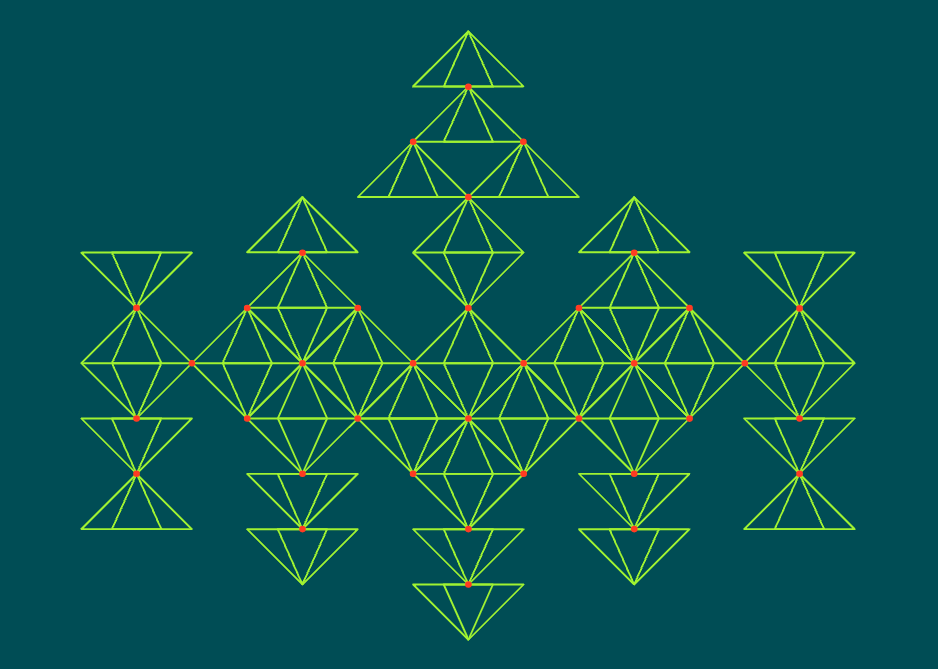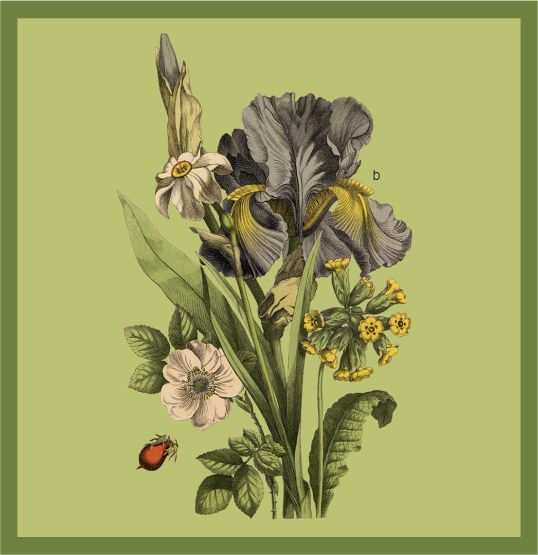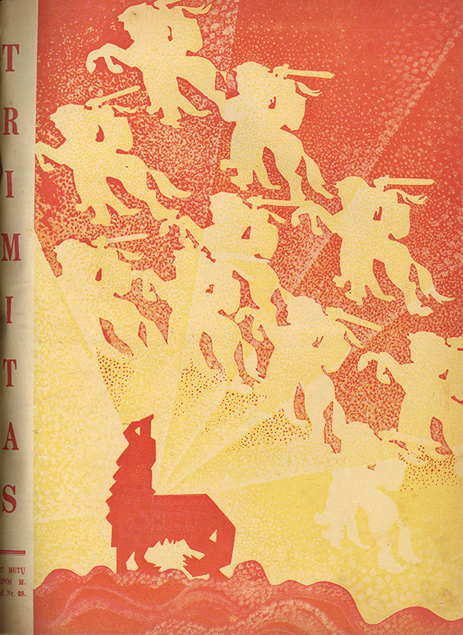To celebrate the 100th anniversary of the Song Festival, a virtual exhibition “For the Song Festival – 100” is presented from the museum’s collections.
The first song festival in Lithuania was held in 1924 in the Exhibition Square in Kaunas. The first song festival was solemnly opened by the then President of the Republic of Lithuania Aleksandras Stulginskis, who invited the assembled participants to sing the National Hymn. The first song festival gave rise to the creation of traditions that are so far extremely important. The Song Festival has become an event that invites all Lithuanians around the world to gather for the days of songs, dances, folklore, theater, as well as a concert of ensembles or kankles. Over the course of a century, the Song Festivals have grown from a two-day event to a week-long tradition that attracts crowds of people, in which the roots of our nationality are intertwined.
In order for the Song Festival to take place, we need choirmasters and leaders who organize the entire course of the celebration. One of the first in 1924. The initiators and organizers of the song festival were Juozas Žilevičius. J. Žilevičius started his path as an organist in Samogitia, where he led choirs together and participated in Lithuanian evenings. Later, while participating in the activities of the Lithuanian Artists’ Society, he also taught in the courses of acting and choir music teachers. Edited the magazines “The Art of Music”, “Music”. While teaching at the Klaipėda Music School, he also staged the operettas of Mikas Petrauskas, and with the students he recorded a lot of Lithuanian folk songs. 1927 He organized the 1st Song Festival of Lithuania Minor in Klaipeda and was one of the initiators. J. Žilevičius’ work was an impressive abundance of Lithuanian folk songs and hymns. Although the classicist theme of music prevailed in the early work of J. Žilevičius, in the later he began to use more modern means of musical expression.
Juozas Naujalis is one of the most important Lithuanian composers and pioneers of choral music, who has occupied a special place in the history of the Song Festival. J. Naujalis, with the support of Count Benedict Henrikas Tiškevičius, received his musical education while studying at the Warsaw Institute of Music. After graduating from the institute, he returned to Lithuania and settled in a small provincial town – Vabalninkas. Later he worked in Rietave and Kaunas. While in Kaunas, he established private courses for organists, which later became a school. In 1899, J. Naujalis secretly formed the choir “Song”, which later grew into the “Song” society. He established the first Lithuanian bookstore in Kaunas, where he distributed works published at his own expense. 1919. A private music school was opened in Kaunas, which was later stateized into the first higher Lithuanian music institution – the Conservatory. J. Naujalis was the organizer and chief conductor of the first song festival in Lithuania in 1924. He cherished national identity and united everyone who feels love for Lithuanian music.
Another famous Lithuanian composer and music educator is Juozas Gruodis, who studied music with Mikas Petrauskas. From 1899 he was organist in Raguvėle, Utena, Mintauja and Alanta, where he led choirs. Juozas Gruodis was the organizer and conductor of the Lithuanian Song Festival of 1928 and 1930. J. December’s works are temperamental, colorful harmonies are often associated with Lithuanian folk melodics and especially with contractual ones. Using innovative elements of the means of musical expression, he enriched the song festivals with his works. J. Gruodis made a significant contribution to the fostering and development of Lithuanian musical culture, and his works are often featured in song festivals, inspiring communion and national spirit.
Another bright trace in the history of the Song Festival was left by the Lithuanian composer and conductor Konradas Kaveckas, who conducted the Lithuanian Song Festival in 1946-1994. While still studying in France, he founded a choir of Lithuanian students and workers in Paris. Along with st. The Cecilia Society edited the magazine “Organist”. Later, in 1940, together with Jonas Bendoris, he founded the Vilnius Music School. As the chief conductor of the Lithuanian Philharmonic Choir, he conducted a lot of works by Lithuanian composers. The works of K. Kaveckas are still often heard at song festivals, as they encourage the fostering of national music.
Stasys Šimkus was a Lithuanian composer and conductor who attended courses with J. Naujalis. He was very fond of participating in Lithuanian evening activities, where he organized choirs and concerts. He deepened his knowledge of music at the Warsaw Institute of Music, and then at the St. Petersburg Conservatory. After graduating from the conservatory, he led belarusian and lithuanian choirs. At the suggestion of the Lithuanian Society, he went to the United States to collect donations for the victims of war. While in the USA, he organized Lithuanian choirs and organized concerts in various cities. After returning, he actively participated in the activities of the Lithuanian Artists’ Society and founded a music school in Klaipeda. Stasys Šimkus was one of the first conductors and organizers of the song festival. Stasys Šimkus’ vocal genres not only influenced the entire Lithuanian song culture, but also brought together hundreds of talented participants and song lovers into one of the most impressive events in Lithuanian culture.
It is impossible to imagine a song festival without choir leaders. One of the best-known choir leaders is Leonas Kazimieras Ulevičius. L. K. Ulevich already in the performance of military service was closely related to music. In the army, L. K. Ulevičius had the honor of leading the men’s choir and playing in a string orchestra. After returning to Kazlai Ore and supported by friends, he went to study at the J. December Music Technicality Inpatient Unit. At the age of just 24, while studying at the inpatient unit of J. December’s Music Technicality, in 1959 he began to participate in a patriotic underground youth organization, which had a strong goal – “<…> to explain to the Lithuanian people the current political situation, to revive nationality, to encourage them to regain their lost freedom and independence from the Russian occupiers.” [1] The meetings of the organization were held in nature, in a different place. For his participation in patriotic underground activities, he was sued and expelled from the inpatient unit of Juozas December Music Technicality in Kaunas. He graduated from this musical technique part-time a little later – in 1967
[1] Janina Marijona Bartoševičienė and Julija Benedikta Ulevičienė, The Silent Bird Hymnist: Memoirs of the Choir Conductor, Expert Music Teacher Leonas Kazimieras Ulevičius (Kaunas: Publishing House LUTUTĖ, 2005), p. 10.
The first Song Festival was funded by the participants themselves. To the first Song Festival, its participants and spectators traveled in different ways, and some reached the celebration even on foot. The second Song Festival, which took place in 1928. In Kaunas, it was dedicated to the celebration of the decade of independence. In order to raise the level of artistry of the choirs, a lot of effort was made by the well-known composer and conductor Juozas Gruodis. In 1930, the third Song Festival took place, which was dedicated to the 500th anniversary of the death of Vytautas the Great. The third Song Festival was attended by even more choirs, and choirs from Riga and Mintauja, Catholic youth, Orthodox metropolitan choirs and others also joined the Lithuanian choirs.
In 1920-1944, regional song festivals were held, which were organized by public organizations – shooters, springers. Regional song festivals were usually held in Klaipeda and Kaunas, somewhat less often in Telšiai, Marijampolė and Panevėžys. After the restoration of the Vilnius region, the song festival was moved from Kaunas to Vilnius, and in 1946 the song festival took place for the first time in Vilnius. Each Song Festival began with the singing of the “National Hymn”.
The 1950s Republican Song Festival in Vilnius was distinguished by the fact that for two days different events were held – the days of song and dance. For the first time, joint choirs of men, women and children appeared. Later, at the Song Festival in 1955, a quota of participants was introduced, and selection of participants was organized in districts and cities. For the first time, in addition to the orchestras of wind instruments, the performances of the orchestra of folk instruments were also held, which received a lot of support from the audience. After the performance of these orchestras, folk musical instruments began to be mass-produced. The newspaper “Sound, Song” was also published, which later became one of the main and traditional publications of this holiday.
The next Song Festival was held in 1960. The program of the Song Festival event included vilnius and kaunas amateur symphony orchestras. In 1960, for the Song Festival, a special estrada was built in Vingis Park. This estrada under the roof accommodated 18-20 thousand people. choristers, among whom there were also schoolchildren. Since 1955, it has been observed that the majority of the participants in the celebration are precisely schoolchildren, and their number is growing with each holiday. The song festival of 1964 was called the “Republican Festival of Schoolchildren’s Songs”. This holiday encouraged the involvement of schoolchildren in cultural activities. The best schoolchildren’s orchestras and choirs received the opportunity to perform at regional song festivals of schoolchildren of Klaipeda, Marijampolė, Telšiai, Panevėžys cities and districts.
In 1965, the Song Festival had a significant turning point – choirs from the USA appeared. The choirs were conducted by the best choirmasters of Vilnius, Kaunas and Klaipėda cities. This Song Festival has had a great resonance, more than 60 articles, reports and reviews have appeared in the press not only from Lithuania, but also from the foreign press. The second Republican Festival of Schoolchildren’s Songs in 1969 was prepared with great care, as a quota of participants was provided and a mandatory repertoire was assigned. Only by learning the compulsory repertoire could they participate in the selections and later perform the program in Vilnius. In 1970, for the first time, an evening of folk songs and ensembles was held, which later became a tradition that is repeated in every Song Festival. The song festival was also supplemented by the marches of the participants to Vingis Park, each region was decorated with its own national clothes, and with the coats of arms of the city marched towards Vingis Park. For the convenience of people, the route was announced in advance. In this way, it was possible to join the march at any time.
In 1975, the Republican Song Festival attracted countless international guests from different corners of the world and everyone talked about the ongoing Lithuanian Song Festival. The choirs performed Juozas Naujalis’ “Lietuva brangi”, which is based on the poem of Maironis. The poem seemed to raise “<…> Lithuania out of stagnation for a new stage of statehood”.[ 2] The Republican Structure of the Song Festival of 1980 can be called traditional, it consisted of an evening of ensembles, days of songs and dances, and marches.
The first song festival of an independent state took place in 1990. Although the song festival was organized in sufficiently difficult economic conditions, the spirit of free citizens was very felt. True, in 1994. Song Festival Song Day took place in Kaunas, in the Valley of Songs. This took place to celebrate the 70th anniversary of the first Song Festival, which began with song day.
[2] The author is unknown. “History.” Song Festival 2024, watched in 2024 03 months. 14 d. https://dainusvente.lt/istorija/
List of references:
- “History.” Song Festival 2024, watched in 2024 03 months. 14 d. https://dainusvente.lt/istorija/
- “Uniqueness.” Song Festival 2024, watched in 2024 03 months. 15 d. https://dainusvente.lt/unikalumas/dainu-diena/
- “Uniqueness.” Song Festival 2024, watched in 2024 03 months. 13 d. https://dainusvente.lt/unikalumas/sokiu-diena/
- Bartoševičienė, Janina Marijona and Julija Benedikta Ulevičienė, The Silent Bird Hymnwriter: Memoirs about the choir conductor, expert music teacher Leonas Kazimieras Ulevičius (Kaunas: publishing house LUTUTĖ, 2005).
- Jakelaitis, Vytautas. “Lithuanian Song Festivals”. Universal Lithuanian Encyclopedia, accessed in 2024 for 4 months. 20, https://www.vle.lt/straipsnis/lietuvos-dainu-sventes/
- Rastenienė, Dalia, “Tradition and symbolism of the Lithuanian Song Festival”. Music Bars, 5-6 (2007): 1-7psl.
The virtual exhibition was prepared by Silvija Jankauskaitė, curator of the collection of the Lithuanian Museum of Education.



